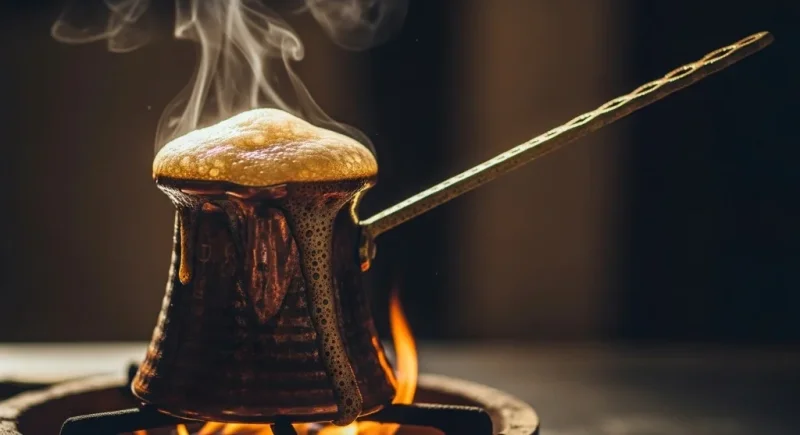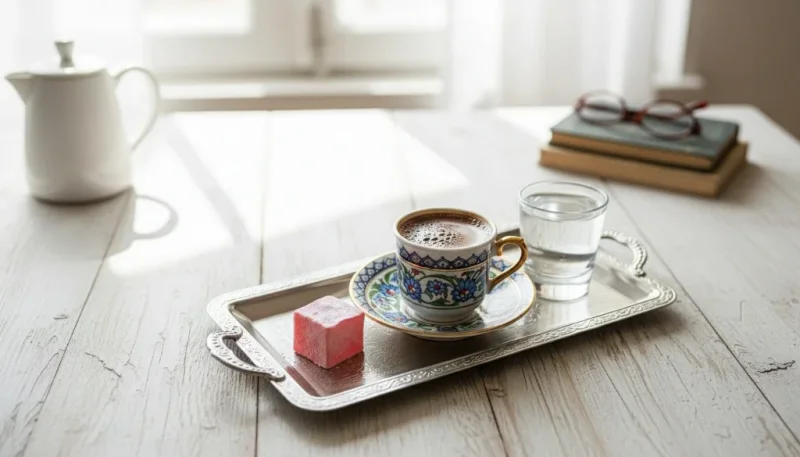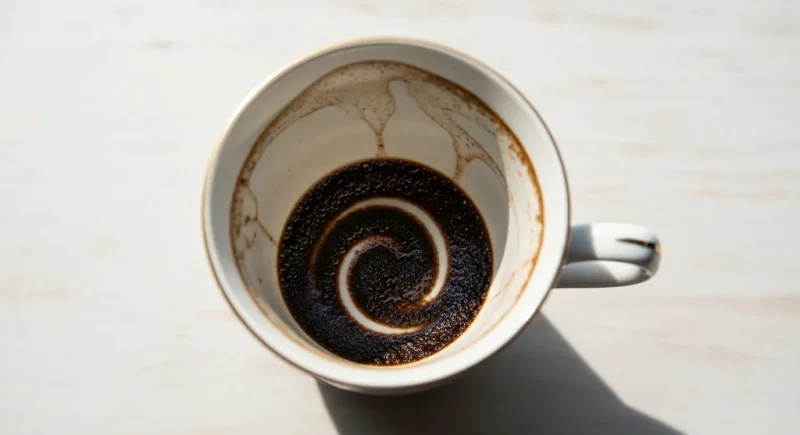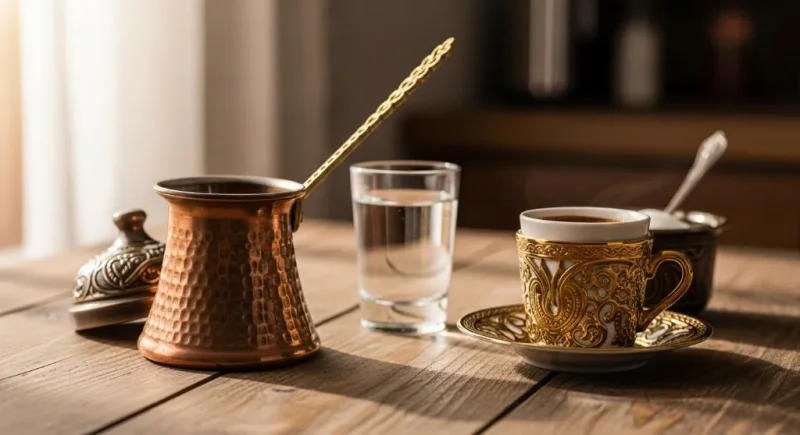First, Turkish coffee is not a type of bean. It is a method of brewing coffee that dates back to the Ottoman Empire.
The secret is in the grind. The beans (typically Arabica) are ground into an ultra-fine powder, much finer than espresso. This powder is then boiled slowly in a special pot called a cezve (jez-VEH) and served unfiltered.
This process creates a strong, full-bodied coffee with a rich layer of foam (called köpük in Turkish) on top.
What Does Turkish Coffee Taste Like?
Because it's unfiltered and brewed slowly, the taste is bold, rich, and concentrated. It is often compared to the intensity of an espresso shot, but the flavor profile is different, more robust and less acidic. It is traditionally served "sade" (plain, no sugar), "az şekerli" (a little sugar), "orta" (medium sugar), or "şekerli" (sweet).
Is Turkish Coffee Stronger Than Regular Coffee?
It has a stronger and more concentrated taste. However, in terms of caffeine, the answer is nuanced.
A typical 2-ounce (60ml) cup of Turkish coffee often contains less total caffeine than a large 8-ounce (240ml) cup of American-style drip coffee. But, because it's so concentrated, it is generally stronger than a single shot of espresso on a per-ounce basis.
How to Make Authentic Turkish Coffee (Step-by-Step)
Brewing Turkish coffee is a ritual. While special machines or sand heaters exist, all you truly need is a cezve and a heat source.
What You'll Need (The Essentials)
- A Cezve: A traditional small pot, usually made of copper or brass, with a long handle.
- Coffee: Must be ultra-fine powder. Standard grinds will not work.
- Cold Water: Using cold water is crucial for a slow brew and good foam.
- Turkish Coffee Cups: Small, espresso-sized cups (called fincan).
- Sugar (Optional): Must be added before brewing, not after.
The 5-Step Brewing Guide
Here is the classic ratio: two full teaspoons of coffee powder and (if using) sugar for one Turkish coffee cup of cold water.
- Measure: For each cup you're making, use one cup of cold water and add it to the cezve.
- Combine: Add two full teaspoons of coffee powder (per cup) and your desired amount of sugar to the water.
- Stir (Only Once): Stir the mixture well before placing it on the heat. Do this until the coffee is submerged and the sugar is dissolved.
- Heat Slowly: Place the cezve on low heat. Do not stir it again. Watch it closely. As it heats, a dark foam (köpük) will build on top.
- The Pour: Just before it boils, the foam will rise quickly. Lift the cezve off the heat. Pour a little of the foam into each cup, then return the cezve to the heat. Let it rise once more, and then pour the remaining coffee slowly into the cups.
Common Mistakes to Avoid:
- Boiling the coffee: If you let it come to a full, rolling boil, you will lose the foam. The foam is the most prized part of the coffee.
- Stirring on the heat: Stirring after you put it on the heat will break the foam and ruin the brew.
- Using the wrong grind: If the coffee is not a fine powder, the grounds will not settle properly in the cup.

How to Drink Turkish Coffee (The Cultural Etiquette)
Drinking Turkish coffee is just as important as making it.
The 3 Rules of Drinking (Do's and Don'ts)
- Wait: When you receive your coffee, let it sit for at least one minute. This is non-negotiable. It allows the coffee grounds to settle at the bottom of the cup.
- Sip: Drink the coffee slowly. It is meant to be sipped and savored, not gulped down like an espresso shot.
- Stop: This is the most important rule for beginners. Do not drink the sludge at the bottom. When you start to taste the grainy grounds, stop drinking.

Why Is It Served with Water and Turkish Delight?
You will almost always receive a small glass of water and often a piece of lokum (Turkish Delight) with your coffee.
- The Water: You should sip the water before you take your first sip of coffee. This cleanses your palate and prepares your mouth to receive the full, rich coffee flavor.
- The Delight: The sweet lokum is meant to be eaten after you finish your coffee, to balance the strong, rich taste.

The Culture and Traditions Beyond the Cup
Turkish coffee is so central to the culture that it is recognized on the UNESCO Intangible Cultural Heritage list. It is the center of social gatherings, hospitality, and important ceremonies.
Why Do Turkish Brides Put Salt in Coffee?
You may have heard of this famous tradition. During a "kız isteme" (when the groom's family comes to ask for the bride's hand in marriage), the bride-to-be prepares the coffee.
This tradition is a foundational test of the groom's character. For a complete guide to the story and its symbolism, you can read our detailed article on why Turkish brides put salt in coffee.
She will purposefully prepare the groom's coffee with salt instead of sugar. This is a test. If the groom drinks the salty coffee without any sign of complaint, it is seen as a sign of his good temper, patience, and deep love for her.
Tasseography: A Beginner's Guide to Fortune Telling
Remember that "sludge" you're not supposed to drink? It has one final purpose.
After finishing the coffee, it's traditional to swirl the cup, place the saucer on top, and flip it over. As the grounds (telve) run down the sides and dry, they form patterns. A falcı (fortune teller) will then read these patterns, a practice called tasseography or kahve falı.
This cultural ritual is the main reason why you do not drink the sludge in Turkish coffee. To learn more about the telve and the art of fortune telling, read our complete guide.
Health & Caffeine: Is Turkish Coffee Good for You?
Because Turkish coffee is unfiltered, it has some unique health properties. The grounds that settle at the bottom mean you aren't consuming them, but the liquid itself contains a higher concentration of the beneficial compounds (like antioxidants) found in coffee.
It is a strong, caffeinated beverage, so it should be consumed in moderation. But a cup of traditional Turkish coffee is a rich, rewarding experience that is a cornerstone of Turkish hospitality.
But what about the specific caffeine content, links to cholesterol, or myths about weight loss? We explore all these topics in our full guide: Is Turkish coffee healthy?

![Jekyll Island Campground Review: Best Sites & [year] Guide](https://www.rotasenin.com/uploads/2025/12/jekyll-island-campground-rv-sites.webp)





Comments (0)
Sign in to comment
Report